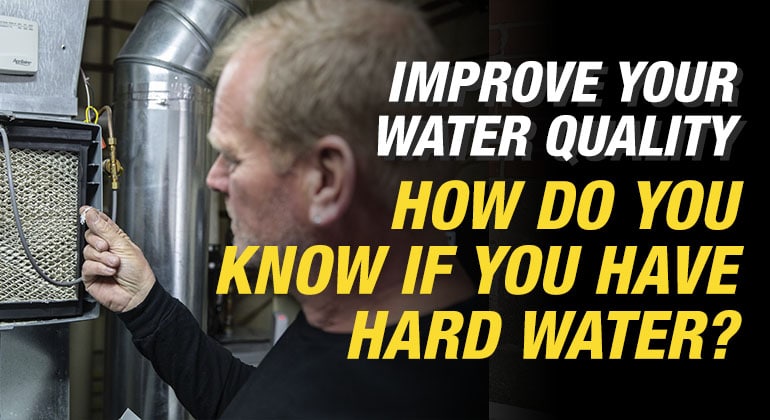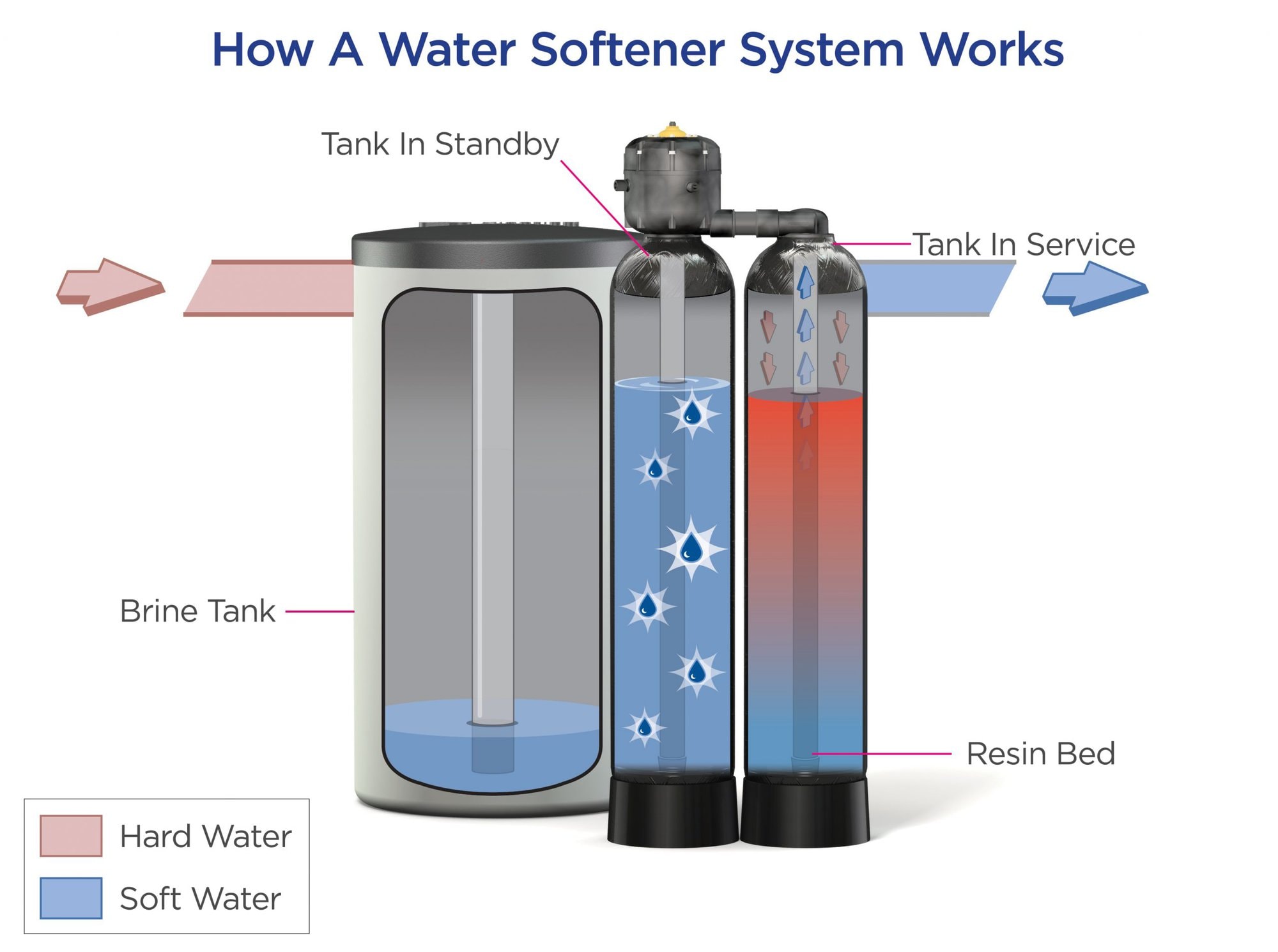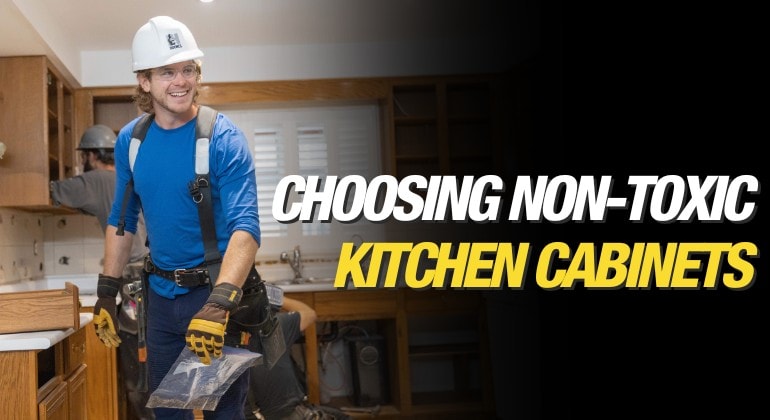When it’s time to replace your HVAC system, you have several options, each with its own benefits. Choosing the right HVAC system depends on your home’s size, climate, energy needs,...

How Do You Know If You Have Hard Water?
By Mike Holmes
Mike’s Advice / Home Renovation
Friday, November 25th, 2022 @ 4:29pm
How Do I Know If My Home’s Water Is Hard?
I’ve talked a lot about hard water recently and shared my personal experience on the effects of hard water at my own home. I kept asking questions about the water in my house because I knew there was something wrong. Showerheads were clogging, and I could feel the hard water on my skin. It was really bothering me. I now have cutting-edge softening and reverse osmosis drinking water systems. When I shower, I can FEEL the difference, and when I drink water, I can taste the difference.

I could taste the difference in my water after installing the Kinetico whole-home water filtration system.
Homeowners should understand the impacts and what they can do to prevent hard water from damaging their pipes and mechanics in their homes. Here’s what you should know about hard water and how to get this issue resolved.
What Is Hard Water?
A few years ago, I was starting to notice my shower heads were caking up with calcium buildup and my humidifying system filters were constantly getting blocked. I had to replace my water heater twice because of hard water damage. I knew I had hard water but I wasn’t completely sure why this was happening.
Hard water is defined by the amount of calcium and magnesium in your water.
The unwanted minerals in hard water leave spots on your dishes and glasses. These minerals also combine with soap leaving a film on your skin, hair and even your laundry. Additionally, hard water scale that accumulates on fixtures and in plumbing and water-using appliances will shorten their lifespan, affect performance and decrease efficiency.

Water-using appliances, particularly those that heat or use heated water, such as water heaters, dishwashers, washing machines, and coffee makers, are frequently affected by scale buildup.
Here is a great article from Kinetico explaining what hard water is.
Why Is It Important To Get Your Water Tested?
I was very fortunate to meet two experts from Kinetico who came to my home to test my water. This was the first step to understanding what was wrong with my water and is what I recommend every homeowner do.
TIP: Whether you rely on well water or municipal water, it’s important to get your water tested by professionals. This will give you a better understanding of what contaminants exist in your water and what system is best suited for you.
Other than hard water, my water test revealed that I have high levels of TDS. TDS = Total Dissolved Solids. It’s simply minerals, salts, metals, cations, or anions that are dissolved in water. This includes inorganic solids such as salts, calcium, magnesium, potassium, sodium, bicarbonates, chlorides, and sulphates. It also includes some trace amounts of organic materials.
How Does Hard Water Affect Your Home?
Hard water lowers the quality of the water throughout the home and will eventually cause limescale buildup in water pipes, reducing the flow of water.
How Does Hard Water Reduce The Lifespan Of Water-Using Appliances
Hard water can significantly affect many of the water-using appliances in our homes, including washing machines, water heaters, dishwashers, and humidifiers. It can even affect small appliances, like kettles and coffee pots.
Washing Machines
When used with hard water, washing machine heating coils can deteriorate more quickly, necessitating an early replacement. The appliance will start to malfunction when the hard water minerals accumulate on the pump and other working parts.
Due to hard water minerals and detergent accumulating in the fibres, clothes washed in hard water may fade more quickly, look dull and dingy, or even feel rougher or stiff. Plus, you will use more detergent or fabric softener when washing in hard water.
Water Heater
When a home has hard water, a water heater’s heating elements may deteriorate considerably and more quickly than predicted, necessitating an earlier replacement. I experienced this directly, so I can attest to its occurrence.
Hard water scale buildup in the unit’s base can decrease efficiency, forcing your water heater to work harder and increasing your energy costs.
RELATED:
Dishwashers
Dishwasher parts can deteriorate faster due to hard water use. Hard water also prevents dishwashers from working to their full capability, causing dishes to look unclean, with water spots and that cloudy film you see on glassware. You will likely also need to use more dishwasher detergent to wash your dishes.
Humidifiers
I mentioned earlier the buildup I was getting on my humidifier filters. It was this white, cakey film, so I can only imagine the residue inside my water tank. This buildup in the filters, tank, and heating components eventually causes the unit to fail.

Noticing a white scale build-up on my humidifier because I had hard water.
Hard Water Can Affect Small Appliances Too
At some point, everyone looked inside their kettle and thought what’s all that white film around the heating element of my kettle? Sometimes white flakes float at the bottom. When the hot water evaporates from a coffee pot or tea kettle, you may notice scale on the surfaces. That scale buildup is from the water evaporating and leaving behind hardness minerals.
How Does Hard Water Affect Your Bathroom & Kitchen
Showerheads, Sinks, And Faucets
Over time, calcium and hard water buildup can clog shower heads and taps, lowering water pressure and reducing the flow of water.

Images from Kinetico, show the effects of hard water on your home.
If the need arises, you may have to get hands-on and disassemble these plumbing parts in order to remove all the debris. Although it’s more work, it is usually possible to clean faucets and shower heads without removing them by using a few common household items.
Showers & Tubs
Hard water can cause soap scum to build up in showers and tubs, making them harder to clean (bathtub ring) and causing water spots on shower doors/curtains, which require special cleaners and frequent cleaning.
Hard water typically prevents soaps and shampoos from lathering well. It also makes it more difficult to rinse the film off your hair and skin, leaving a residue behind.
Pro Tip: After each shower, use the squeegee to wipe the water from the glass and walls. This will help reduce hard water spots and stains. The shower’s interior can also be kept clean by wiping it down with a microfiber towel after each use or by using a daily shower cleaner.
Countertops & Kitchen Sinks
The effects of hard water will eventually be evident in most areas of your home where water comes into contact with something. Countertops and sinks are no different. Surfaces like porcelain, enamel, china, stainless steel, tile, chrome, and glass will all show signs of mineral deposits, stains, or a white film.
Toilets
Porcelain toilet bowls will develop unattractive reddish stains or rings from hard water that contains iron. These stains or rust spots are hard to remove and will return even after a good cleaning if you have hard water.
Dishware, Silverware, And Glassware
Do you ever notice water spots on glasses, silverware, or dishes, especially if air-dried? Those water spots are caused by dissolved minerals that are left behind when hard water dries.
What’s The Solution For Hard Water?
Hardness levels vary depending on where you live. While levels between 80 and 100 mg/L are less worrying, water with hardness levels above 200 mg/L is regarded as poor quality, and homeowners should think about making some improvements. However, in all cases, the goal should be soft water which is a hardness level of less than 17.1 mg/L for all homeowners as over time hard water can cause damage to your home and to you.
Once I had my water tested and knew I could make a significant improvement to my water, I installed a Kinetico Premier Series Water Softener, and a reverse osmosis Kinetico K5 Drinking Water Station.
RELATED:
How Does A Water Softener Work To Reduce Hard Water Levels?
A water softener is designed to remove calcium and magnesium hardness minerals as well as certain types of iron and manganese that cause the scale buildup in your pipes and other problems around your home.
Water softeners have a resin bed that uses an ion exchange process to remove calcium and magnesium ions from your water, exchanging these hardness ions for soft ions. With a Kinetico water softener, the ion exchange process occurs when needed, 24 hours a day, seven days a week to provide you with clean, soft water on demand.
Point-of-Entry Water Treatment – Kinetico Water Softener
What I love about the Kinetico Premier Series® water softener is that it is a twin tank, high-efficiency system with a 20-micron pre-filter, which captures any sediment, silt, sand, or anything that is 20 microns or larger, protecting the system’s inner workings and valves.

The Kinetico Premier Series Water Softener I had installed in my house.
A twin tank system means one tank is always in service, while the other is on standby. So when one tank is exhausted and starts a regeneration, the other tank kicks in – resulting in 24-7 softened water.
Kinetico has a range of Water Softeners to suit every homeowner’s needs.
How To Maintain A Water Softener
One of the best features of Kinetico’s Water Softener is its ability to self-maintain. Typically, salt is used in the regeneration process to clean the resin beads. When the resin bed reaches its softening capacity, a regeneration or cleaning must take place. All I have to do is add water softener salt to the storage tank every now and then.
During regeneration, the system draws a brine solution from the salt storage tank when the resin bed is full of hardness ions. This brine solution cleans the resin bed, preparing it for further water softening.
With a Kinetico system, once regeneration is complete, the tank that was cleaned is now ready and standing by to provide soft water when the tank that is in service is exhausted.
Smart Monitoring With The Kinetico Kinex Salt Monitoring System
I’m a big fan of smart homes because to me it means convenience especially since I plan to age in my house. That’s why I’m excited about the Kinetico Kinex Salt Monitoring system. This device is installed with your water softener and measures your salt usage and the amount of salt left in the brine tank, so you do not have to manually check it.
This monitor is connected to the Kinetico App on your smartphone or tablet and will send you salt level notifications when you need to add salt to the brine tank.
Drinking Water Filtration System To Improve Your Water Quality
A water softener is designed to eliminate calcium, magnesium, and in some cases iron from your water. However, it is not able to remove other contaminants that may be in your water. Installing a reverse osmosis system in conjunction with a water softener ensures that you have the best water for all applications throughout your home. As a result, a water softener and a reverse osmosis system are excellent investments.

A reverse osmosis filtration system utilizes high pressure to force the water through a semipermeable membrane, allowing only pure water molecules to flow through providing clean and healthy drinking water.
Not only do these systems improve the quality of your water, but you’ll also even be able to taste the difference.
RELATED:
Not All Home Improvement Projects Are DIY
When it comes to water treatment, there’s not a one-size fits all solution. To find the best treatment method, you need to work with a water expert to determine what systems make sense for your home.
Get your water tested by professionals. This will help determine the appropriate water treatment methods available. It will also allow them to make the right recommendations that fit your needs and budget.
On my Holmes on Homes podcast, I spoke with Michael Crepeault, a Kinetico water professional, who told me, “Buy a filter or be a filter”! That really stuck with me. Our bodies act as a filtration system for all of the harmful contaminants we consume. That’s why it’s very important to understand what’s in your water and take the right steps to improve your water quality.
READ NEXT:
How To Choose The Best Reverse Osmosis (RO) Water System
Why Is Your Water Bill So High? Inside Leaks Explained










